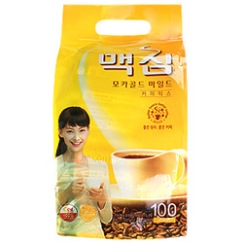(Prescript: After I posted this, WordPress kindly informed me of this related post)
A product which is ubiquitous in Korea and among the Korean community in Australia is Maxim Mocha Gold Mild Coffee Mix (맥심 모카 골드 마일드 커피 믹스, mak-shim mo-ka gol-deu ma-il-deu keo-pi mik-seu), a long, narrow sachet of coffee powder, milk powder and sugar or sweetener. It is notable that this product uses six ‘English’ (or at least non-Korean) words in a row. I put ‘English’ in inverted commas because four of them are, in turn, loanwords into English.
maxim was probably chosen as a brand name for its connotations of Parisian chic. Maxim’s restaurant was founded by Maxime Gaillard in 1893. His first name is derived from Latin maximus, superlative of magnus great. (In English, maxim as a common noun means ‘an expression of a general truth or principle, especially an aphoristic or sententious one’, from Medieval Latin maxima prōpositiō, literally, greatest proposition.)
mocha is used either to refer to a drink with coffee, chocolate and milk, or to a variety of coffee bean, however it is used in a drink. Either way, the name is taken from a port city in Yemen. The word/name is Arabic, but I haven’t been able to find an exact translation. Google Translate unhelpfully translates المخا as ‘Mokha’.
gold has been an English word since ‘before 900’ (this is a far back as reliable written evidence of English is available). It has cognates in many other Germanic languages. The Korean word for ‘gold‘ is 금 (geum), which is hidden away in the original name of the electronics (and many other things) company LG – 락희금성사 (rak-hui (= lucky) geumseongsa (= goldstar)). The planet Venus is also called 금성 (gold star). (The names of the five naked-eye planets in Korean are related to the Chinese philosophy of the elements: Mercury is the water star, Venus the gold star, Mars the fire star, Jupiter the wood star and Saturn the earth star.)
(Korean sometimes mixes languages. In 2008, watching Korean telecasts of the Beijing Olympics, I got used to hearing 금메달! (geum me-dal!) If you think Australian telecasts are biased, just watch the Korean ones!)
mild has also been an English word since before 900, and Wiktionary gives cognates in Danish, Dutch, German and Swedish. Google Translate gives 10 translations for ‘mild’, the first being 가벼운 (ga-byeo-un, light, mild, careless, airy) – Google Images shows feathers, aerogels and manufactured items such as computers and running shoes – and the second 온후한 (mild) – Google Images shows skin creams and nutritional supplements. In neither case is there an image of coffee, not even this brand.
coffee is a loanword from Arabic qahwah, via Turkish kahve and Italian caffè (French café is obviously also related, but the drink and the word seem to have entered England and English via Italy and Italian). The Korean transliteration 커피 (keo-pi) should not be confused with 코피 (ko-pi), which means ‘nose blood’ or ‘a blood(y/ied) nose’. (There is a joke about Dracula’s favourite drink being 코피!) While I am typing this, I am drinking another pre-mixed coffee called ‘French cafe peu-ren-chi ka-pe ka-pe mik-seu, in which ‘café’ and ‘coffee’ are both transliterated ‘카페’, possibly deliberately reflecting French, which uses ‘café’ for both.
mix is not immediately obviously a loanword, but it is derived from Latin mixtus, the past participle of miscēre to mingle. It was first used in English as an adjective ‘mixed’ in the early 15th century, then as a verb and noun from late that century.
Loanwords from English and occasionally other languages are often used in Korean to connote modernity or internationalism. Where a Korean word and a loanword are used alongside each other, the former is more traditional (for example, 식당 (shik-dang) v 레스토랑 (re-seu-to-rang)).
(Definitions etc from Dictionary.com)



In Japan, the equivalent used to be called Creap, which (of course) stands for “creamy powder”. 🙂
LikeLike
There’s another Japanese product, available in Korea, named ‘Sweat’, which is a sports drink (ie designed to replace what the sweat takes out).
LikeLike
That’s right! It’s called Pokari Suetto or something like that. Though my personal favourite weird product name was Puberty Notepaper …
LikeLike
The Korean version of Pocari Sweat has the English spelling on one side of the can and the Korean on the other.
LikeLike
Pingback: Never Pure and Rarely Simple
Pingback: 500th post | Never Pure and Rarely Simple